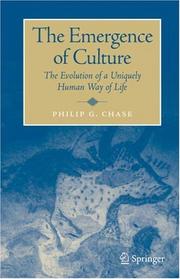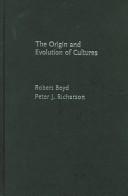| Listing 1 - 4 of 4 |
Sort by
|

ISBN: 0387305122 9780387305127 9786610623990 1280623993 0387306749 Year: 2006 Publisher: New York : Springer,
Abstract | Keywords | Export | Availability | Bookmark
 Loading...
Loading...Choose an application
- Reference Manager
- EndNote
- RefWorks (Direct export to RefWorks)
Paleolithic archaeologists and human paleontologists have failed to address the origins of a phenomenon that is both absolutely central to the human way of life and unique to our species. In all species of mammals, there are codes (rules, concepts, values, etc.) that govern behavior. Among humans, and only among humans, some of these codes are created socially, through interactions among individuals. Other species may learn codes socially, from their parents or other members of their species, but the codes are not created socially. Human culture is thus an emergent phenomenon, one that cannot be understood without taking into account the interactions among individuals. Because human society creates the culture that governs individual behavior, it can control individual members in a way that other primate societies cannot. Culture can facilitate cooperative and group activities, but can also lead individuals to behave contrary to their own evolutionary best interests. This book describes the emergent nature of human culture. It proposes hypotheses to explain how a phenomenon that is potentially maladaptive for individuals could have evolved, and to explain why culture plays such a pervasive role in human life. It then reviews the primatological, fossil, and archaeological data to test these hypotheses.
Culture --- Social evolution --- Cultural evolution --- Cultural transformation --- Culture, Evolution of --- Evolution --- Social change --- Origin of culture --- Civilization --- Origin --- History --- Social evolution. --- Origin.


ISBN: 0199883122 128056055X 9786610560554 0195347447 1423756851 1433700581 9781423756859 0195165241 9780195165241 019518145X 9780195181456 9781280560552 6610560552 9780195347449 9781433700583 9780199883127 0197731155 Year: 2005 Publisher: Oxford New York Oxford University Press
Abstract | Keywords | Export | Availability | Bookmark
 Loading...
Loading...Choose an application
- Reference Manager
- EndNote
- RefWorks (Direct export to RefWorks)
This text presents, in one convenient and coherently organized volume, 20 influential but until now relatively inaccessible articles that form the backbone of Boyd and and Richerson's path-breaking work on evolution and culture.
Social evolution. --- Culture --- Human evolution. --- Sociobiology. --- Biologism --- Human biology --- Human evolution --- Psychology, Comparative --- Social evolution --- Evolution (Biology) --- Physical anthropology --- Evolutionary psychology --- Human beings --- Origin of culture --- Civilization --- Cultural evolution --- Cultural transformation --- Culture, Evolution of --- Evolution --- Social change --- Origin. --- Social aspects --- Origin --- History
Book
ISBN: 9004252002 9789004252004 9789004251687 9004251685 Year: 2013 Publisher: Leiden : Brill,
Abstract | Keywords | Export | Availability | Bookmark
 Loading...
Loading...Choose an application
- Reference Manager
- EndNote
- RefWorks (Direct export to RefWorks)
Origins and Futures: Time Inflected and Reflected provokes an interdisciplinary dialogue about culture, politics, and science’s strategies to divert the relentless trajectory of time. Literature, socio-political policy, physics, among other subjects, demonstrate the human refusal to enlist in temporal determinism. Articles ranging from how detective fiction and international terrorism manipulate the narration of events, to the unlocking of political trauma through forgiveness, to the genetic archaeology of the Human Genome project and the lacunar amnesia of nuclear energy corporations, all argue that wherever human minds meet they wrestle to undo the irrevocable, the irreversible, the fixed. Although such efforts look to the future, they rarely look straight ahead. Whatever their enterprise, writers, philosophers, and scientists believe that origins are alacritous keys to future hopes and aspirations. Contributors include: Marcus Bullock, Michael Crawford, Patricia Engle, Carol Fischer, J. T. Fraser, Sabine Gross, Paul Harris, Rosemary Huisman, Karmen MacKendrick, Steven Ostovich, Walter Schweidler, Friedel Weinert, and Masae Yuasa.
Time --- Culture --- Life --- Future, The. --- Time in literature. --- SOCIAL SCIENCE / Human Geography --- Origin of culture --- Civilization --- Abiogenesis --- Biogenesis --- Germ theory --- Heterogenesis --- Life, Origin of --- Life (Biology) --- Origin of life --- Plasmogeny --- Plasmogony --- Evolution (Biology) --- Exobiology --- Spontaneous generation --- Social aspects. --- History. --- Philosophy. --- Origin. --- History --- Origin
Multi
ISBN: 9780521769013 0521769019 9780521189712 0521189713 9780511779978 9780511789434 0511789432 0511779976 1282725009 9781282725003 1107209358 9781107209350 9786612725005 6612725001 0511788703 9780511788703 0511786832 9780511786839 0511785690 9780511785696 0511787979 9780511787973 Year: 2011 Publisher: Cambridge Cambridge University Press
Abstract | Keywords | Export | Availability | Bookmark
 Loading...
Loading...Choose an application
- Reference Manager
- EndNote
- RefWorks (Direct export to RefWorks)
In this book, Kate Distin proposes a theory of cultural evolution and shows how it can help us to understand the origin and development of human culture. Distin introduces the concept that humans share information not only in natural languages, which are spoken or signed, but also in artefactual languages like writing and musical notation, which use media that are made by humans. Languages enable humans to receive and transmit variations in cultural information and resources. In this way, they provide the mechanism for cultural evolution. The human capacity for metarepresentation - thinking about how we think - accelerates cultural evolution, because it frees cultural information from the conceptual limitations of each individual language. Distin shows how the concept of cultural evolution outlined in this book can help us to understand the complexity and diversity of human culture, relating her theory to a range of subjects including economics, linguistics, and developmental biology.
Linguistics --- Philosophy of nature --- Human beings --- Human evolution. --- Language and languages --- Social evolution. --- Origin. --- Antiquity of human beings --- Origin of human beings --- Human evolution --- Origin of languages --- Speech --- Cultural evolution --- Cultural transformation --- Culture, Evolution of --- Culture --- Evolution --- Social change --- Evolution (Biology) --- Physical anthropology --- Evolutionary psychology --- Origin --- Communication. --- Material culture. --- Social interaction. --- Origin of culture --- Civilization --- Human interaction --- Interaction, Social --- Symbolic interaction --- Exchange theory (Sociology) --- Psychology --- Social psychology --- Folklore --- Technology --- Communication, Primitive --- Mass communication --- Sociology --- History --- humanities --- evolution --- language [general communication] --- Arts and Humanities --- Philosophy --- cultuurfilosofie
| Listing 1 - 4 of 4 |
Sort by
|

 Search
Search Feedback
Feedback About UniCat
About UniCat  Help
Help News
News